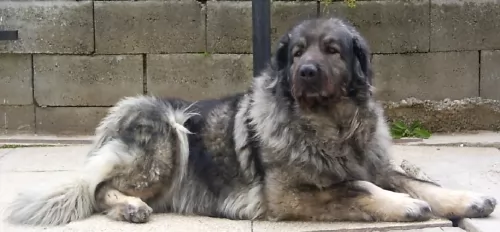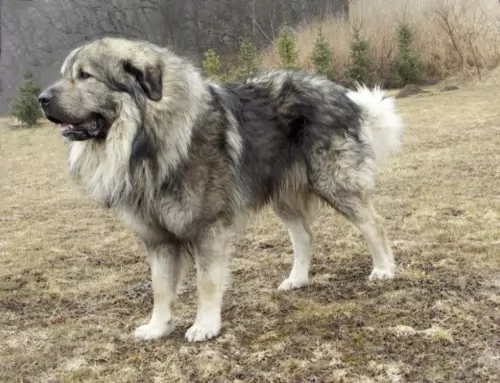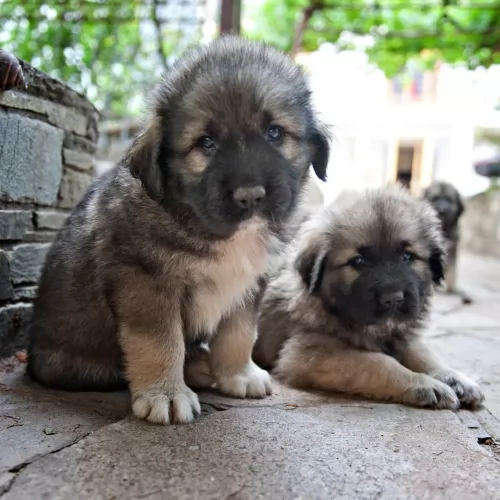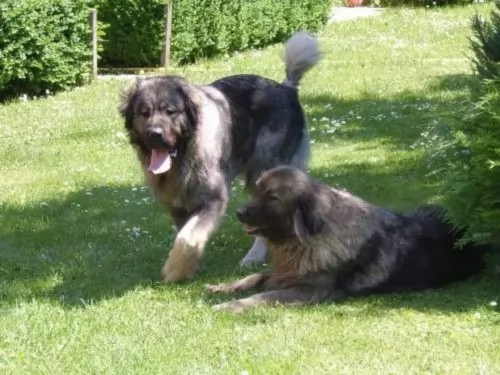 Petzlover
Petzlover Sarplaninac is originated from Macedonia but Wheaten Terrier is originated from Ireland. Sarplaninac may grow 12 cm / 5 inches higher than Wheaten Terrier. Sarplaninac may weigh 25 kg / 56 pounds more than Wheaten Terrier. Both Sarplaninac and Wheaten Terrier has almost same life span. Both Sarplaninac and Wheaten Terrier has same litter size. Both Sarplaninac and Wheaten Terrier requires Moderate Maintenance.
Sarplaninac is originated from Macedonia but Wheaten Terrier is originated from Ireland. Sarplaninac may grow 12 cm / 5 inches higher than Wheaten Terrier. Sarplaninac may weigh 25 kg / 56 pounds more than Wheaten Terrier. Both Sarplaninac and Wheaten Terrier has almost same life span. Both Sarplaninac and Wheaten Terrier has same litter size. Both Sarplaninac and Wheaten Terrier requires Moderate Maintenance.
 Hailing from Macedonia, the beautiful Sarplaninac dog was developed as a guardian of livestock and is large enough to fight off large predators like bears and wolves.
Hailing from Macedonia, the beautiful Sarplaninac dog was developed as a guardian of livestock and is large enough to fight off large predators like bears and wolves.
Nobody is too sure of the breeds exact origins, though it is thought that its ancestors came to the Balkan Peninsula with people migrating from ancient Asia.
This huge dog is one of the oldest native breeds from ancient Molosser breeds. The dog was recognized in 1939, and in 1954 it became known as the Yugoslav Shepherd Dog. Later the name changed and the dog was recognized by the United Kennel Club in 1995.
 The dog was bred to be a useful dog to have around the farm. He was needed to help with the guarding and herding of livestock and to keep the rat population down.
The dog was bred to be a useful dog to have around the farm. He was needed to help with the guarding and herding of livestock and to keep the rat population down.
This little dog has a long history, but in spite of this, he wasn’t recognized as a breed in his home country by the Irish Kennel Club until 1937.
It was in 1943 that the Wheaten was recognized by the British Kennel Club. They were exported to the United States in the 1940s and recognized by the American Kennel Club in 1973.
 The Sarplaninac is a large, strong, fluffy dog standing at between 54 and 62cm in height and weighing between 30 and 45kg.
The Sarplaninac is a large, strong, fluffy dog standing at between 54 and 62cm in height and weighing between 30 and 45kg.
The coat of the dog is dense, coarse and of medium length. Colors are different shades of grey, white, tan and black. The head is large, the ears are fairly short but are floppy and covered with short hair. The dog is deep chested and the tail is long, often held high and covered with thick, feathery hair.
Protective, reliable, reserved, stubborn and gentle, this intelligent dog is fairly serious, and while he makes a devoted family pet, he is cool and wary of strangers.
Excellent training and socialization makes him well mannered, balanced and obedient around different people. He will tolerate children but won’t take easily to other pets in the house, capable of becoming aggressive with them.
 The Wheaten Terrier is a robustly built, medium-sized dog with males and females standing at between 43 to 50cm in height and weighing between 13 to 20kg.
The Wheaten Terrier is a robustly built, medium-sized dog with males and females standing at between 43 to 50cm in height and weighing between 13 to 20kg.
The soft, single coat is a silky texture and a wheaten, gingery color. A bonus is that the coat doesn’t shed much. Puppies are born with darkish coats of a reddish-brown color but the coat lightens significantly as the puppy grows older.
Most Wheaten Terrier owners opt to have the dog professionally groomed. Their tails have always been docked.
Your Wheaten Terrier is a smart dog, albeit headstrong and stubborn. His intelligence makes it easy to have him trained.
They love their human family and aren’t known for any aggression issues. They’re energetic, playful dogs and are sometimes even looked upon as being hyperactive. They’re able to get along well with other dogs and cats in the house. They generally make great family pets.
These dogs are well suited to life in the city as well as the countryside just so long as he gets his daily walks and other forms of exercise.
 These dogs are protective, but they’re not vicious. When properly raised they are wonderful family pets.
These dogs are protective, but they’re not vicious. When properly raised they are wonderful family pets.
True, it’s a large, strong willed dog that isn’t a good choice for the first-time dog owner. They are good with children, but only children who have been taught how to treat animals with care and patience.
This dog is a powerful guardian type of dog, imposing in size, but it’s all about upbringing, and if you bring him up well then he can make a tremendous pet and companion.
 The Wheaten Terrier is such a bouncy, lively little dog that he brings joy into any home.
The Wheaten Terrier is such a bouncy, lively little dog that he brings joy into any home.
He is energetic, playful and full of the joys of living but you don’t want to take advantage of his good nature.
Don’t leave him stuck in your back yard but include him in all your family activities. He’s your best friend, providing you with unconditional love that few humans can equal.
 The Sarplaninac dog is a robust dog but he can suffer from health issues such as hip dysplasia, obesity, bloat, ear infections and skin allergies.
The Sarplaninac dog is a robust dog but he can suffer from health issues such as hip dysplasia, obesity, bloat, ear infections and skin allergies.
When your dog gazes up at you with such love in his eyes, don’t be tempted to pop some chocolate into his mouth or let him finish off your ice-cream. Treats like this can damage your pet’s health and give him heat intolerance, breathing difficulties, hypertension, liver disease and diabetes.
 Your Wheaten Terrier is a dog breed that can live healthily with you for a good number of years.
Your Wheaten Terrier is a dog breed that can live healthily with you for a good number of years.
Just like most other dogs, they are prone to some heritable diseases. Perhaps a condition to look out for with this particular dog is protein wasting conditions - protein-losing nephropathy (PLN) and protein-losing enteropathy (PLE).
Both of these diseases are actually fatal but if caught early enough, they can be managed with dietary changes and medication.
Your dog produces proteins known as enzymes, one group being digestive enzymes that help with the breakdown and digestion of food. When your pet battles with malabsorption, digestive enzymes don’t absorb protein and it passes through the large intestine into the faeces. Your dog will have inflammatory bowel disease.
 Every dog needs care from puppyhood through to old age.
Every dog needs care from puppyhood through to old age.
Šarplaninacs are looked upon as medium maintenance dogs. The coat is long and thick and requires a firm bristle brush to get their hair brushed.These dogs are moderate shedders so a brush twice a week will do the trick to keep the hair free of loose hair and matting.
Because these dogs have floppy ears, they will need to be checked and cleaned. Floppy eared dogs battle with moisture and wax build-up that increases the likelihood of ear infections.
Check the eyes that they are clear and free of discharge. Eyes with a lot of discharge can be indicative of health problems.
Check for any unusual lumps as cancer often starts with a new lump.
Provide your pet with a nice warm, dry place to sleep.
Keep his vaccines up to date to prevent deadly canine diseases.
Have him or her spayed or neutered if you don’t want puppies. These are regular procedures for a vet and offers health benefits for the dog. Neutering a male improves his character and keeps him from roaming. These dogs are capable of having 3 – 8 puppies.
The Sarplaninac requires decent food if he is to remain healthy. Dog’s stomachs can become upset if they eat all kinds of sweet and spicy human foods.
Commercially manufactured dog food is a good backup food to have because of its convenience. Try to include some home-made food. Simply add into one big pot chicken, brown rice or pasta and spinach, sweet potatoes and carrots. This food can all be chopped up and added in to the dry kibble twice a week. Give this to your pet twice a week and see how his tails wags when he smells it.
Also try to add in some raw meat to his food occasionally.
Ensure there is always a bowl of fresh, cool water within his reach.
 Brush your pet’s coat twice a week to keep it healthy and have him professionally trimmed to keep him looking nice and groomed.
Brush your pet’s coat twice a week to keep it healthy and have him professionally trimmed to keep him looking nice and groomed.
Dental disease is a common problem with dogs, and more specifically small dogs. Dental problems start with tartar build-up on the teeth and then infection of the gums and roots can set in too. The teeth have to be kept in good condition as rotten teeth can have a negative impact on other important body parts like the heart and kidneys.
Have your pet vaccinated against bacterial and viral infections such as rabies and parvo.
Speak to your vet about the many worms and other parasites that can invade your pet’s body.
Provide your Wheaten with the best food there is to encourage good health and longevity. Keep his meals simple and consistent and always go for high-quality foods that are in keeping with your dog’s age, Kibble as well as home-made food are good choices. Never leave your pet without a constant source of fresh, cool water.
Provide your Wheaten Terrier with good exercise. Remember though that these dogs are sensitive to warm temperatures, and you don’t want to have him exercising in hot weather because of the fear of heat stress.